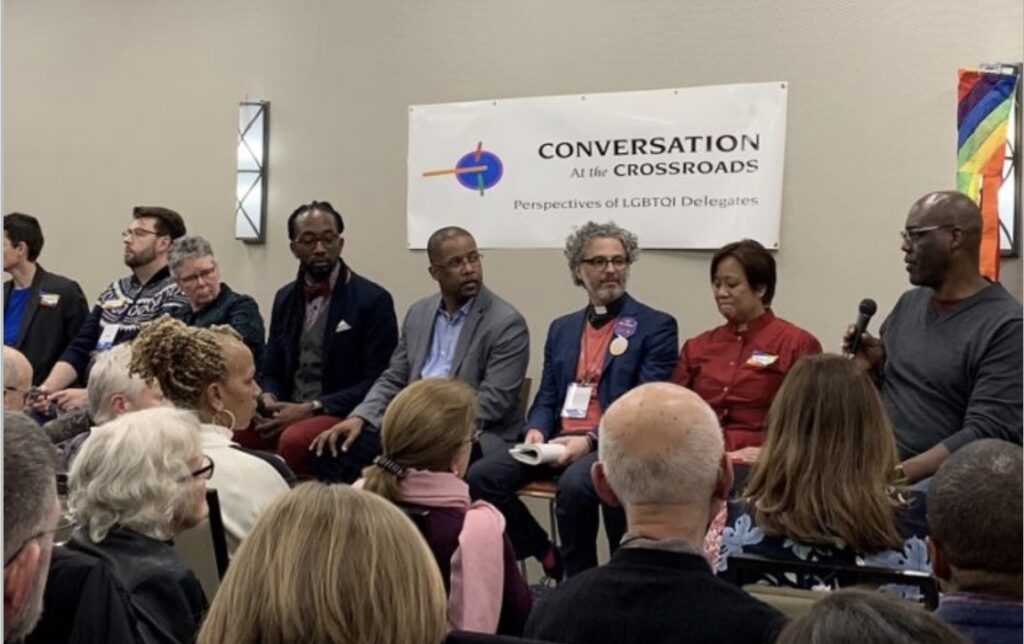[Jeffrey Walton | Juicy Ecumenism] A group of lesbian, gay, bisexual and transgender (LGBT) delegates to the United Methodist General Conference made clear Friday evening that they will not allow the denomination’s governing body to move forward if it becomes apparent that increased clergy accountability measures are poised to pass.
Asked if one of three plans submitted by the church’s Commission on a Way Forward (CoWF), known as the Traditional plan, could pass, The Rev. Dr. Alex da Silva Souto declared “we’ll shut it down.”
Souto, Senior Pastor at New Milford United Methodist Church in Connecticut, spoke February 22 on a panel of LGBTQI delegates to General Conference titled “Conversation at the Crossroads”.
Several panelists voiced support for a progressive option known as “The Simple Plan” while some grudgingly offered support to a CoWF-proposed plan backed by a wider group of progressives, known as the “One Church Plan” as an interim measure. Panelists indicated that disruptive actions were a possibility as the conference began legislative work on Sunday.
“Nothing is off the table at this point,” noted Baltimore-Washington Annual Conference Delegate Jen Ilho, expressing concerns the OCP could be “co-opted” by unfriendly amendments.
As for a modified version of the Traditional Plan, Ilho assessed it as “Frankly Dreadful” while another delegate dubbed it “Evil”.
New York Annual Conference Delegate Dorothee Benz called for a “refusal to be complicit in unjust structures.”
“We are going to own our own agency in this and refuse complicity,” Benz declared of the legislative process, which several panelists dismissed as “unjust structures.” Instead, Benz called on those gathered in the standing-room-only Holiday Inn conference room to go about “creating a different reality. That is what has gotten us to this point and what will bring us home.”
The panel, which was convened by the Queer Clergy Caucus, insisted that the Simple Plan was not a radical plan, and that it and the OCP had been mischaracterized and misunderstood.
“They [central conference delegates] have been told that a vote for the One Church Plan or the Simple Plan is a vote for homosexuality, and that is not true,” asserted New York Annual Conference delegate Karen Prudente. “Missionaries really pounded in a colonial mentality that we [persons of Asian ancestry] then spread throughout the world.”
Panelists were also clear about those who opposed their proposals. While acknowledging that some in the UMC held traditionalist views that they were working through, “I think there are a bunch of evil folks in the church who are into the pain thing,” assessed Dr. Randall Miller.
Asked about the Wesleyan Covenant Association, which advocates for a version of the Traditional Plan, Benz was dismissive: “If they want to leave, don’t let the door hit you on the way out.”
“I wouldn’t spend too much time worrying about them leaving,” Miller added. The former Reconciling Ministries Network (RMN) executive advocates forming a commission that will “charge a high price” for those traditionalists who may seek to leave the denomination. “You’re not going to leave us with all the bills.”
“Some friends genuinely grieve that we cannot all be together, I’m no longer one of them,” Miller announced. “There is no evidence that the WCA is leaving. God, let us savor the fact that we are in control of one teeny tiny thing: the trust clause.”
“That’s the key. We have to be solidly behind stopping any sort of gracious exit, because that’s the only reason some of those folks haven’t left,” asserted Ilho. “Let there be no exit plan beyond what is currently in the discipline, or, make it as difficult as possible so that they don’t leave and leave their debts behind.”
“These are the same people who think the kids in the cages on the border are just fine,” Benz accused, calling for an intersectional approach across issues.
Down the hallway, other members of the broader Love Your Neighbor Coalition of progressive caucus groups held a connected event for international delegates featuring a bible study and dinner with an Illinois pastor originally from Kenya.
The event, titled “Stronger Together” was billed as an opportunity for United Methodists from both the Central Conferences and the United States “see how we are already working together to advance justice and peace on a global basis.”
[Editor’s Note: This article was written by Jeffrey Walton and originally published at Juicy Ecumenism. Title changed by P&P.]











